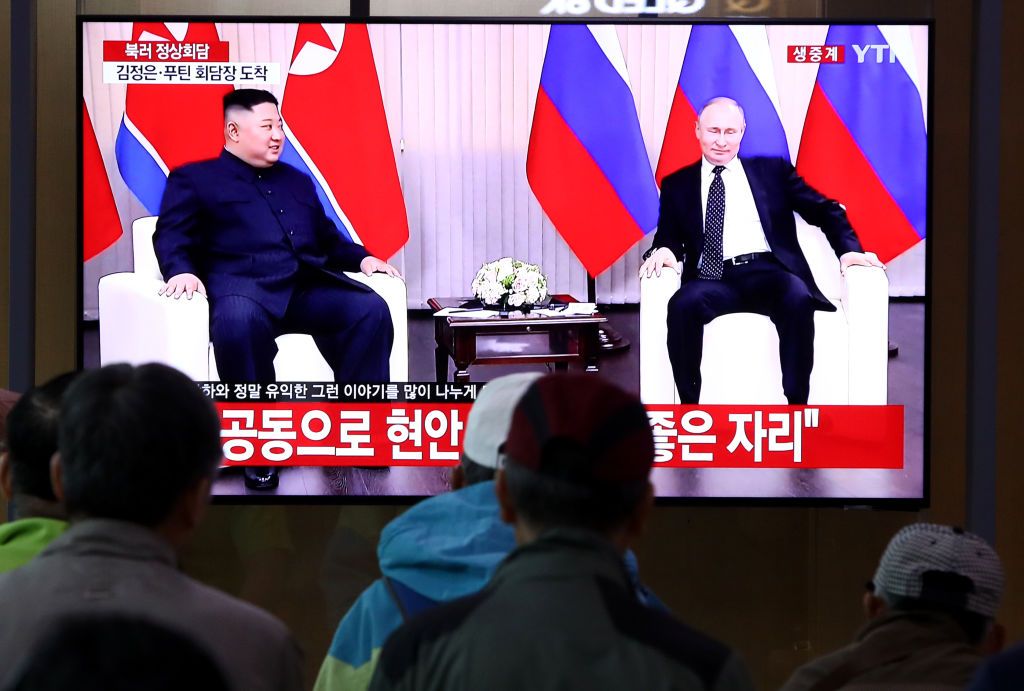Opinion: Europe has a Russian fossil fuel addiction

German Chancellor Olaf Scholz looks at the Siemens gas turbine intended for the Nord Stream 1 gas pipeline in Russia at a Siemens Energy facility in Muelheim an der Ruhr, Germany, on Aug. 3, 2022.(Andreas Rentz/Getty Images)

Svitlana Romanko
Founder and director of Razom We Stand
Over two years into Russia’s full-scale invasion of Ukraine, and Europe is still addicted to Russian fossil fuels. In spite of 13 sanctions packages against Russia and endless words of solidarity for Ukraine, recent data has revealed that many European Union countries continue to import massive amounts of liquified natural gas (LNG), propping up Russian President Vladimir Putin’s genocidal regime.
The European Union has taken steps to break free from Russian fossil fuels in the wake of the full-scale invasion, having launched the REPowerEU plan in May 2022 to mitigate Russia’s energy blackmail and banned the import of Russian oil. But while there has been a decline in imported pipeline gas from Russia, the inflow of Russian LNG to European ports has been on the rise, justifiably raising eyebrows about the efficacy of existing sanctions against Russia’s energy sector and the Kremlin’s primary source of income.
For instance, Germany ceased direct imports of Russian gas in the summer of 2022, but fresh data from the environmental non-profits Urgewald and Bond Beter Leefmilieu revealed that significant amounts of Russian LNG enters the country via the Netherlands and Belgium. Bond Beter Leefmilieu found that up to 11% of the gas sent to Germany from Belgium originated as Russian LNG in 2022.
Meanwhile, Spain and Belgium were the second and third largest importers of Russian LNG in 2023, respectively. LNG originating from Russia’s Arctic gas fields is regularly shipped to European ports, including Zeebrugge in Belgium and Montoir-de-Bretagne in France. Taken together, Belgium, France, and Spain account for a staggering 80% of imports. It’s clear that, despite European officials’ outward support for restricting the flow of Russian LNG to the European Union, the reality on the ground tells a very different story.
The problem becomes more alarming when we consider that European Union countries collectively import around $1 billion worth of Russian LNG per month. Russia’s 2024 federal budget, which reflects the staggering growth of its military-industrial complex, should tell the European Union all it needs to know about where its contributions to Russian LNG are going.
While sanctions have resulted in small strides toward reducing countries’ reliance on Russian fossil fuels, the battle is clearly far from won. More decisive actions are required to halt the flow of funds fuelling Russia’s war. The European Union’s recent commitment of 50 billion euros ($54 billion), while commendable, represents only 27% of their total fossil fuel imports from Russia since the start of the full-scale invasion, estimated at 189 billion euros ($205.3 billion).
Clean, renewable energy sources have proven to be the most economical and effective solutions for weaning off of fossil fuels. As European Union governments consider their energy strategies, it’s crucial to acknowledge that fossil fuels have no place in a world grappling with costly climate disruption and the fight against petro-dictators like Putin.
To truly support Ukraine and dismantle financial support for Russia’s war, the European Union must ban all Russian-shipped and pipeline gas, as well as intensify sanctions against Russian fossil fuel exports.
Editor’s Note: The opinions expressed in the op-ed section are those of the authors and do not purport to reflect the views of the Kyiv Independent.











